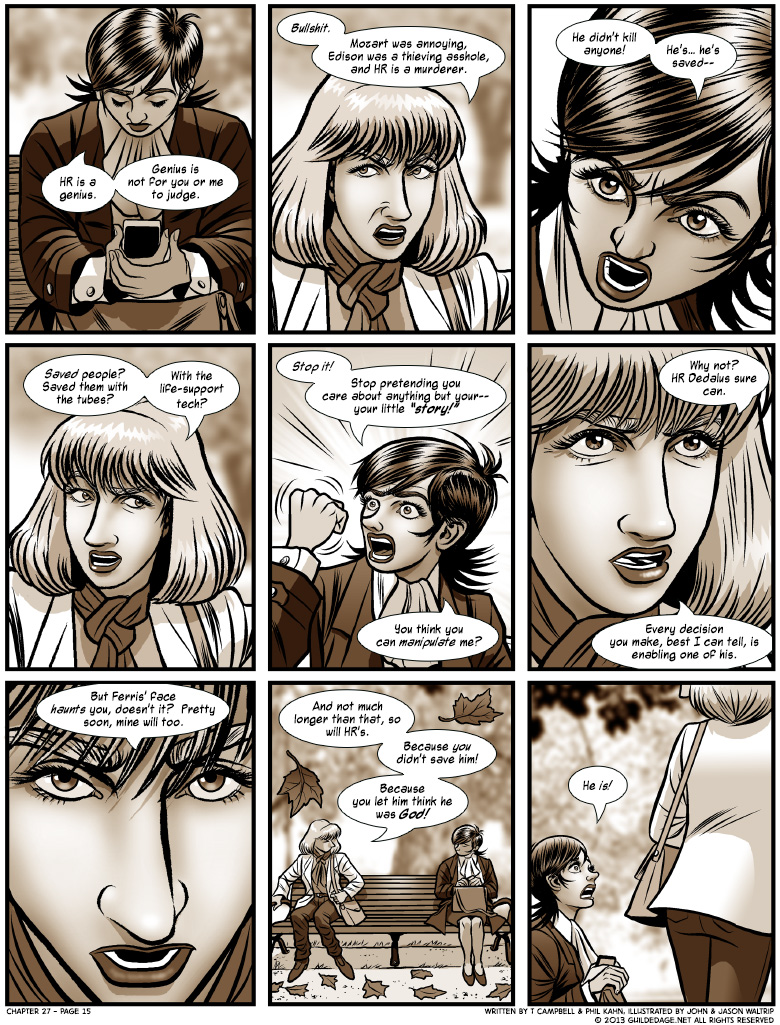Annotated 27-16
 One irony I like about this chapter is that the “fantasy” side, despite featuring a ghost, an interdimensional doorway, and a portentous dream about an existential threat to the universe, is fairly relaxed and low-key. Meanwhile, it’s the “reality” side, best summarized as “two people talk out their differences in a coffee shop and park,” that is tense and action-packed.
One irony I like about this chapter is that the “fantasy” side, despite featuring a ghost, an interdimensional doorway, and a portentous dream about an existential threat to the universe, is fairly relaxed and low-key. Meanwhile, it’s the “reality” side, best summarized as “two people talk out their differences in a coffee shop and park,” that is tense and action-packed.
Another thing I enjoy here is the chance to use the 3X3 grid and slight variations thereof persistently. Even after twenty years of doing this professionally, I still feel a bit mystified and intimidated at the properties of the different possible comics layouts, but the sort of constrained tension from that grid makes a big impression on anyone who studies Watchmen.
Not that you need any visual cues to tell who’s winning this conversation, but now it’s Carol who’s sitting and Shanna towering over her.











Is the list of reasons to judge geniuses meant to be escalating? Because ‘annoying’ doesn’t seem of a kind with theft and murder. (Also, even as escalation it’s a much larger jump from ‘annoying’ to ‘theft’ than ‘theft’ to ‘murder’, IMO.)
I’m not altogether sure I understand the question or problem here, but I’ll give it a whirl. Sure, there’s definitely escalation, and that makes it mildly funny to me, but for me, it’s HR that’s the bigger jump. Edison, as a dead man, is a much less urgent concern, and his thievery, while increasingly accepted as such by history, was pretty much legal by the fluid standards of his day, not of the break-into-your-house-and-take-your-things variety. The main point of Shanna’s little exercise, though, is to point to two or three figures who are both widely acknowledged as geniuses and also widely acknowledged as worthy of some form of judgment. Doesn’t matter so much what they’re being judged for as that they’re judgeable. Once she’s knocked over Carol’s smart-sounding platitude, she can resume her offensive.
I’ve been thinking a bit lately about deference to experts, let alone geniuses in their fields: to pick the example you’re probably already thinking of, if Fauci tells me to wear a mask, I’ll wear a mask. But expertise has areas. I’d even listen to HR if he were doing a PR-initiative YouTube series called “Elements of Game Design,” but not so much if it were called “Ethics” or “Observing Employee Boundaries.”
If anything I think the fact the first two are so petty in comparison makes the third hit a little harder, it’s like saying “None of my friends are perfect, Joe always forgets to take out the garbage, Dan leave the dishes out overnight, and Scott keeps strangling the homeless.” It’s like, everyone’s done a little bad, but back on subject, third guy kills people, can’t be that perfect. I make a frequent joke when someone does something inconvenient and becomes overly apologetic, or self critical about it, which is the principal in reverse. I tell people they are the worst, just the worst, it’s Hitler, Attilla the Hun,(or whatever historical figure who is responsible for multiple atrocities I can think of) and then them (usually this is because they like forgot to grab napkins or something). The gulf between their actions, and the value judgment that puts their actions on the same level is the joke. Or at least a way of emphasizing the point. (In one case how bad HR is, in another, how not terrible the person actually is.)
On Experts: Humans have a weird fetish for putting people on pedestals. That pretty person you like watching in films, your brain naturally assumes if they are good at one thing (even if in this case that’s not acting so much as making you go “Yum” when they walk on screen) they must be good at everything. Once we accept someone as “good” or decide they possess “greatness” in some way, we have a lot of trouble categorizing them beyond that. They just become awesome to us, like little gods. I mean the amount of writers I love who hold forth on political topics and who I at first am nodding along with, and then swiftly realize the ability to structure and tell a story well, even understanding the human condition, does not mean they know what the hell they’re talking about when it comes to policy, is vast. The same goes for actors painters politicians, and even scientists I know. This whole virus situation has brought the fact that people can be literally the best at one thing, and useless at others into very stark light (also that some of those people have important jobs and make decisions way out of their field on a daily basis, and like, maybe they shouldn’t). Keeping people in perspective is something that takes pretty constant vigilance, our brain turns to worship without much prompting.
Watchmen is a darn fine comic to take your cues from.